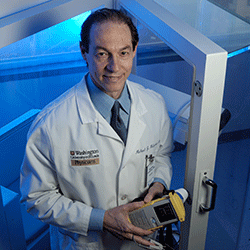Two faculty members from Washington University in St. Louis have been named fellows of the American Association for the Advancement of Science (AAAS), the world’s largest general scientific society.
The new fellows are Michael J. Holtzman, MD, and Rohit V. Pappu, PhD. The rank of fellow is the highest honor awarded by AAAS in recognition of distinguished efforts to advance science or its applications.
The WUSTL faculty members are among 388 new fellows acknowledged in the Nov. 29 issue of Science magazine. The 2013 AAAS fellows also will be honored Feb. 15 at the organization’s national meeting in Chicago.

Holtzman
Michael J. Holtzman
Holtzman, the Selma and Herman Seldin Professor of Medicine, is being honored by AAAS for his distinguished contributions to understanding and treating chronic lung diseases such as asthma and chronic obstructive pulmonary disease and the role of respiratory viruses in these disorders.
At Washington University School of Medicine, Holtzman has performed pioneering research on the unsuspected link between acute viral infection and chronic inflammatory disease. His recent insight uncovered the possibility that viral infections may reprogram lung stem cells as a renewable trigger for chronic inflammation. In addition to defining the cause of lung disease, Holtzman has led the development of a drug discovery program that includes new facilities for high-throughput screening, medicinal chemistry and structural biology. As part of the program, scientists are identifying new therapeutics and translating them into practice to reduce excess mucus production, combat viral infection and inhibit inflammation in the airway.
Holtzman earned his undergraduate and medical degrees from Northwestern University and completed his medicine residency at Duke University and a pulmonary fellowship at the University of California, San Francisco. He came to WUSTL in 1987, where he became the director of the Division of Pulmonary and Critical Care Medicine in 1992 and received a joint appointment in the Department of Cell Biology and Physiology.
Holtzman has received numerous awards for his research contributions. He was elected to membership in the American Society of Clinical Investigation and the Association of American Physicians. He is also the recipient of a Career Investigator Award from the American Lung Association and a Recognition Award for Scientific Accomplishments from the American Thoracic Society. He also was named the J. Burns Amberson Lecturer by the American Thoracic Society, which honors one individual each year for distinguished scientific contributions to the understanding, prevention and treatment of lung disease. Most recently, he was chosen to serve on the National Advisory Council for the National Institute of Allergy and Infectious Diseases. He also is an active editor, serving on editorial boards for five research journals, and a productive writer, having published 200 scientific articles on his research.
A key characteristic of Holtzman’s approach has been the multidisciplinary nature of his group’s research activities. He notes that the complexity of common diseases must be addressed with similarly complex teams to achieve a solution. Holtzman sees his role as assembling and guiding this team to deliver an effective drug to treat severe respiratory diseases, which have become increasingly common.

Pappu
Rohit V. Pappu
Pappu, professor of biomedical engineering, is being honored by AAAS for distinguished contributions to the field of intrinsically disordered proteins and their form and functions, through a unique combination of computer simulations, polymer theories and experiments.
Pappu focuses his research on the biophysics and engineering of intrinsically disordered proteins. His lab has made important contributions to understanding sequence-ensemble relationships of proteins that fail to fold autonomously into well-defined three-dimensional structures. These efforts are contributing to de novo design of protein interaction networks involved in signaling pathways and transcriptional regulation organized around disordered proteins as hubs. His research is supported by the National Institutes of Health and the National Science Foundation.
Pappu’s lab also has a significant emphasis on aging-related protein misfolding and aggregation, with a particular focus on neurodegenerative disorders such as Huntington’s and Alzheimer’s diseases. The central goal is to understand how protein aggregation and protein homeostasis pathways collude to give rise to neuronal death as a function of aging.
Pappu also is director of the Center for Biological Systems Engineering in the School of Engineering & Applied Science. Research within the center focuses on modeling, predicting and designing functions of biological systems that result from integration of signals and responses of biomolecular and cellular networks.
In addition, he is co-director and member of the executive committee of the Center for High Performance Computing and an adjunct professor in the Department of Biochemistry & Molecular Biophysics, both at Washington University School of Medicine. He also is a member of the Hope Center for Neurodegenerative Disorders at the School of Medicine.
Pappu earned a doctorate in theoretical and biological physics from Tufts University and a bachelor’s degree in physics, mathematics and electronics from St. Joseph’s College in Bangalore University. He completed postdoctoral research in the Department of Biochemistry & Molecular Biophysics at Washington University School of Medicine and the Department of Biophysics & Biophysical Chemistry at Johns Hopkins University School of Medicine. He joined the faculty in the School of Engineering & Applied Science in 2001.

